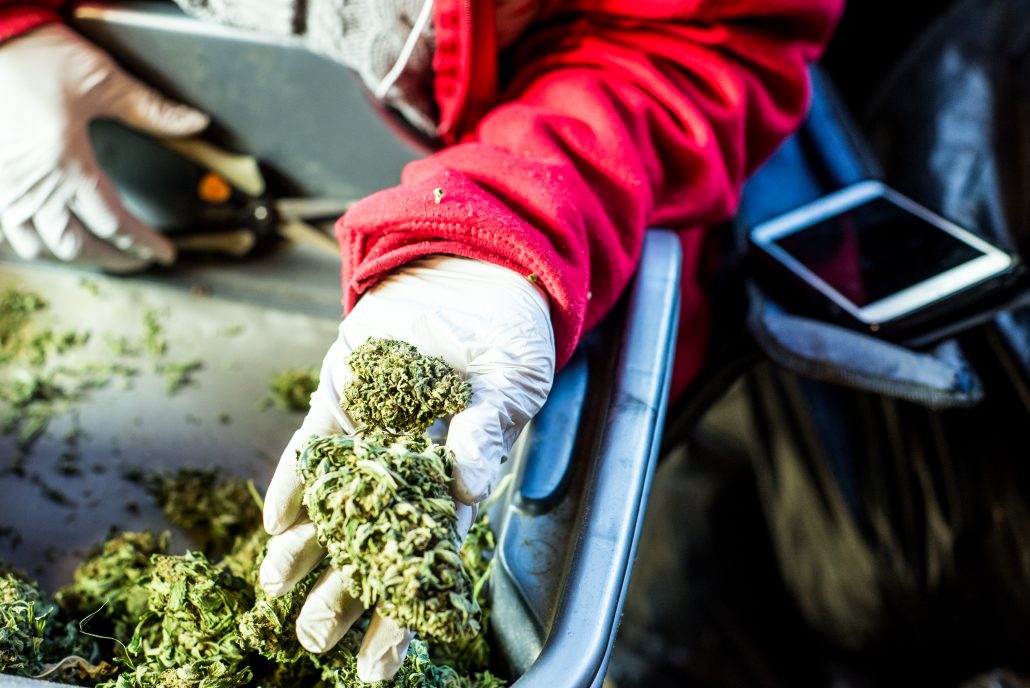by Justin Mckibben | Jan 8, 2018 | Donald Trump, Drug Policy, Law Enforcement, Marijuana, News

Last week we reported on the story of President Trump’s Attorney General Jeff Sessions rescinding a marijuana memo from the Obama administration that established a policy of refraining from federal interference with state laws concerning marijuana use. Once the announcement hit the internet, people from all sides of the argument began chiming in with either praise for the “rule of law” stance of this administration, or adamant opposition of this new policy that essentially reignites the “war on weed” in America.
This announcement came only days after the state of California had officially enacted the legalization of recreational marijuana. Needless to say, the conversation has not yet been dismissed. One voice came from the American Civil Liberties Union (ACLU).
American Civil Liberties Union VS Sessions
For some background, the American Civil Liberties Union is a nonpartisan, nonprofit organization with a stated mission:
“to defend and preserve the individual rights and liberties guaranteed to every person in this country by the Constitution and laws of the United States.”
The ACLU has over one million members and works through litigation and lobbying while providing legal assistance in cases when it considers civil liberties to be at risk.
In response to the news of Jeff Sessions rescinding the Obama-era policy for a hands-off approach to legal marijuana states, the deputy director of the American Civil Liberties Union, Jesselyn McCurdy stated:
“Criminalizing marijuana may be a priority for Attorney General Sessions—who has spent decades using bad science to push his own regressive agenda—but it is not a priority for the American people, 52 percent of whom support legalization. Rescinding this guidance is yet another example of how this administration’s ‘law and order’ philosophy is deeply out of touch with most Americans. With today’s decision, the Department of Justice is essentially telling at least six states and the District of Columbia that they are not entitled to govern as they see fit when it comes to drug policy. For politicians who purport to believe in ‘small government’ and states’ rights, this is a wildly incongruous move.”
Later on in the statement, McCurdy concludes,
“The War on Marijuana, like the War on Drugs, has failed by almost every measure—with the exception of successfully destroying communities of color. Marijuana criminalization negatively impacts public housing and student financial aid eligibility, employment opportunities, child custody decisions, and immigration status. Today’s decision furthers entrenches the country in racially biased, fiscally irresponsible, and morally wrong drug policy—and the ACLU will continue to fight it.”
And the ACLU is most definitely not alone in this mindset. Both Democrats and Republicans are openly criticizing this shift, with some like Senator Cory Gardner promising to oppose it at every opportunity.
Compassion Not Punishment
The backlash from this most recent decision from Jeff Sessions has come from all directions. Pretty much every publication and news outlet has covered this controversial move. As of now, there is no definitive answer as to how this policy change will impact those states where medical marijuana use is legal, or how it will impact the recreational marijuana industry.
But despite the fact that marijuana has become increasingly supported for medicinal use across the country, with many advocating for recreational use as well, the reality remains that drugs can still be abused, regardless of their legal status.
According to the National Institute on Drug Abuse (NIDA), marijuana use can lead to an individual developing problems known as marijuana use disorder. Data from recent studies research suggests:
- 30% of those who use marijuana may have some degree of marijuana use disorder
- Use of marijuana before age 18 makes someone 4-7 times more likely to develop marijuana use disorder
The NIDA also states that marijuana dependence occurs when the brain adapts to large amounts of the drug by reducing production of and sensitivity to its own endocannabinoid neurotransmitters. In 2015:
- About 4.0 million people in the United States met the diagnostic criteria for a marijuana use disorder
- Only 138,000 voluntarily sought treatment for their marijuana use
So while some may still experience difficulties due to their use of marijuana, the focus should still remain on support and assistance through compassionate care and treatment, not punishment. Regardless of whether you support the decision of the attorney general, or if you stand with the American Civil Liberties Union and other legalization advocates, you can support compassionate and comprehensive treatment for those who do struggle with substance use disorder.
Marijuana use disorder is a real condition for some people. If you or someone you love is struggling with a substance use disorder, such as chemical dependency or addiction, please call toll-free now to speak with a specialist today. We want to help!
CALL NOW 1-888-922-5398
by Justin Mckibben | Jan 4, 2018 | Addiction Stigma, Donald Trump, Drug Abuse, Drug Policy, Law Enforcement, Marijuana, News

Before the hype around recreational use of marijuana in California could even begin to dwindle, new reports are stating that President Trump’s Attorney General Jeff Sessions is planning to begin a federal crackdown on marijuana laws.
Jeff Sessions is set to announce today that he is rescinding memos sent out from the Obama administration that established a policy of non-interference with state laws concerning marijuana use. For some time now there have been several stories highlighting Jeff Sessions’ disagreement with allowing states to decide their own laws concerning medical or recreational marijuana use. Some sources indicate he has been planning a new strategy that will actually bring federal law to a head against state marijuana policies.
UPDATE: According to The Washington Post, Jeff Sessions notes in a memo sent to U.S. attorneys that federal law prohibits the possession and sale of marijuana. Sessions undid four previous Obama administration memos that advised against bringing prosecutions in states where marijuana was legalized to use for recreational or medical purposes. Sessions said prosecutors should use their own discretion in weighing whether charges were appropriate.
So what does all this mean for marijuana states?
The Obama Era Policy
The memo essentially describing the Obama-era policy through the Justice Department is known as the “Cole Memo”. It was named after then-Deputy Attorney General Jim Cole in 2013.
The “Cole Memo” outlined new priorities for federal prosecutors in states legalized use of marijuana. These shifts in policy represented a major change from the strict enforcement approach of past administrations to an attitude of non-interference. Back in 2014 U.S. Congress approved legislation preventing the DEA from carrying out any raids, arrest, or prosecutions of patients using medical marijuana. Congress also blocked law enforcement agencies under the Justice Department from consuming federal dollars in efforts to enforce federal marijuana laws in states that have legalized the use of medicinal marijuana. Under President Barack Obama, the Department of Justice did not pursue action against states that legalized recreational marijuana use. In 2015 there was a bipartisan effort in Congress to block the DEA from using federal funding for aggressively pursuing marijuana in the states where it was legalized.
The Obama era outline essentially allowed states to decide whether or not to legalize marijuana and to what extent. The federal prosecutors would not intervene as long as the state regulations did not threaten other federal priorities. So the distribution of marijuana to minors and cartels was still prohibited.
So with this announcement, many are wondering if Jeff Sessions will be working to undo other changes as well.
The Jeff Sessions Reversal
At the time of writing this article, whether or not Jeff Sessions will offer up a new strategy for dealing with marijuana-friendly states or not has yet to be seen. At this time the great concern is how this announcement may end up putting state and federal law in conflict, and what to expect out of enforcement from the federal government.
But many say this is a frustrating development, especially considering that President Trump has said in the past that he would not allow his attorney general to change the current policy, telling a reporter that,
“I’m a states person. I think it should be up to the states, absolutely.”
If we go back to February of 2017, Sean Spicer suggested in a press conference that the Trump administration and the Justice Department already had the intentions to no longer turn a blind eye to states with their own legal marijuana laws. At the time Spicer said the Trump administration would be “taking action” against these states. Contradicting all the talk of states’ rights and rolling back federal enforcement.
Many are wondering if President Trump was consulted about this decision, or if he has been made aware of the implications of this change. Especially since it goes against his original campaign promise to leave marijuana laws to the states.
This move would lay the groundwork for the federal government to begin a crackdown on the rapidly increasing marijuana industry all across the country. If these reports are confirmed this afternoon with no new innovations in their place, this move could have a drastic impact on the economics around the marijuana industry.
Sessions Track Record
However, this should all come as no surprise, since Jeff Sessions has repeatedly spoken out against decriminalization of marijuana and a return to the failed tactics of the War on Drugs at every turn.
In fact, a key adviser on marijuana policy to Jeff Sessions, Dr. Robert DuPont, believes drug testing should be a routine part of primary-care medicine. He has gone as far to suggest that primary-care physicians should be given the power to force some patients into treatment against their will. DuPont also suggests the following treatment to subject individuals to monitoring and random drug tests for up to 5 years.
Dr. Robert DuPont was among a small group of drug-policy experts involved last month in a closed-door meeting with Sessions to discuss federal options for dealing with the rapid liberalization of state marijuana laws.
The Marijuana States
Eight states and the District of Columbia have laws allowing for personal consumption of marijuana for recreational purposes. 28 states and the District of Columbia have legalized marijuana for medical use. Even more states recently have begun to talk about changes in their own policies. California voters pushed through legislation to legalize recreational use back in November of 2017, and with the start of the New Year, those laws went into effect. Now, not even a week later, the fate of this state’s new policy is hanging in the balance.
Needless to say, marijuana advocates all over the nation are troubled by this news. According to NORML Political Director Justin Strekal,
“If the Trump administration goes through with a crackdown on states that have legalized marijuana, they will be taking billions of dollars away from regulated, state-sanctioned businesses and putting that money back into the hands of drug cartels,”
But some states are not ready to give up on their marijuana laws. Other Republicans, such as Colorado Senator Cory Gardner, are avidly speaking out in opposition to the recent decision by Jeff Sessions. Senator Gardner has vowed to prevent any new appointees for the Department of Justice from being confirmed until this reversal has been reversed.
Hopefully, when Jeff Sessions makes his official announcement, we will have some more clarity on how the federal government plans to address marijuana use going forward.
Marijuana Abuse
While the legal status of marijuana may soon be up for a serious debate, the fact remains that it is still possible to abuse marijuana. Whether a drug is legal or not, there are still risks. There are already plenty of legal drugs that cost thousands of lives every year. When substance use becomes habitual it can be extremely harmful to an individual who struggles with substance use disorder. Even though marijuana is not claiming lives like the opioid epidemic, for some it has adverse effects on the quality of life.
While marijuana is not considered to be as dangerous as other illicit drugs, such as heroin or methamphetamines, it can cause dependence for people who use the drug. The typical consensus that marijuana is not as physically destructive and addictive as other “harder” drugs doesn’t change the fact that psychiatrists also believe the psychological impacts of a substance do matter when talking about an addiction. These effects can be just as detrimental.
Marijuana addiction treatment offers a safe and secure environment while providing a variety of therapeutic opportunities to help develop a healthy lifestyle without relying on the use of marijuana or other drugs.
There still needs to be resources available to help people who suffer from abuse. Supporting addiction recovery means breaking the stigma and offering holistic and effective solutions. Palm Healthcare Company is here to help. If you or someone you love is struggling, please call toll-free now.
CALL NOW 1-888-922-5398
by Sher Delva | Jul 18, 2017 | Addiction, Addiction Stigma, Addiction Treatment, Drug Abuse, Mental Health, Stigma, Therapy, Uncategorized

(This content is being used for illustrative purposes only; any person depicted in the content is a model)
A new Oregon bill is headed straight to the governor’s desk.
If passed, the bill would reclassify certain illicit drugs from a felony to a misdemeanor. The goal is to reduce the state’s prison population.The bill would also increase access to treatment for those without prior felonies or convictions for drug possessions, the Washington Post reports.
The bill would reduce penalties for possession of heroin, cocaine, meth and other illicit substances. The bill was already approved by the state legislature and now awaits the signature of the governor.
“We are trying to move policy towards treatment rather than prison beds,” said state Senator Jackie Winters, co-chair of the Public Safety Committee. “We can’t continue on the path of building more prisons when often the underlying root cause of the crime is substance use.”
Also included in the bill is a new initiative that will track the effects of law enforcement policies and procedures by collecting data on the demographic of Oregonians stopped by police. This initiative aims to identify any potential racist practices and address the disproportionate number of black Oregonians behind bars.
According to a 2016 report, by the Sentencing Project, blacks make up less than 2% of the state’s population; yet represent more than 9% of the state prison population as of 2014. Furthermore, the report found that the incarceration rates for black individuals are 5.6 times that of whites.
“Too often, individuals with addiction issues find their way to the doorstep of the criminal justice system when they are arrested for possession of a controlled substance,” says Kevin Campbell, executive director of the Oregon Association Chiefs of Police. “Unfortunately, felony convictions in these cases also include unintended and collateral consequences including barriers to housing and employment and a disparate impact on minority communities.”
Still, some lawmakers are wary of the bill and disagree with its “soft on crime” approach. State Senator Betsy Johnson, a Democrat who voted against the bill, said the shift toward decriminalization promotes a “hug-a-thug policy.”
The bill is headed towards the desk of Governor Kate Brown who will ultimately have the final say. In the past, Governor Brown has expressed support for the bill.
“While we still have much work ahead, HB 2355 represents an important step towards creating a more equitable justice system to better serve all Oregonians,” said Brown. “Addressing disparities that too often fall along racial and socioeconomic lines should not be political issues.”
While states like Oregon are attempting to address these disparities, on the federal level, things are headed in a different direction. Recently, Attorney General Jeff Sessions attended a D.A.R.E. training conference in Texas. While at the conference, Jeff Sessions praised the D.A.R.E. program of the 80s and 90s and hinted at bringing back that initiative today.
D.A.R.E is famously known as the “Just Say No” anti-drug initiative led by Nancy Reagan that took over school campuses in the 80s and 90s. The problem with the campaign is that there were never any proven results stating the program was effective in lowering drug use.
According to the U.S. Bureau of Justice Assistance:
“To date, there have been more than 30 evaluations of the program that have documented the negligible long-term impacts on teen drug use.”
Although the program has undergone some changes, the effectiveness of the initiative remains uncertain. Overall, it is interesting the different strategies certain parts of the country are taking in regards to addressing addiction. While some are focused on decriminalization, other areas have a tougher approach.
What are your thoughts on these new policies? Getting help can save a life, and treatment can offer a far better future than prison. If you or someone you love is struggling, please call toll-free now.
CALL NOW 1-888-922-5398




